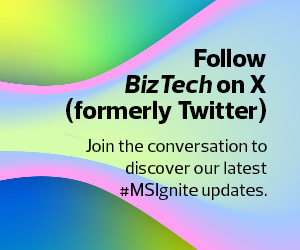How Microsoft Plans to Help Organizations Bolster Productivity with AI
Jha said that Microsoft is now focused on bringing its AI stack to the Microsoft products that millions of its customers interact with daily so that businesses can use natural language to complete their work. The ideal outcome? To Jha, it’s a transformation of the way we do work in society.
“It's about grounding this AI in the users’ context,” he said. “What do they work on? Who do they work with? Their meetings, their conversations, their documents or emails — bringing all of this to bear in the apps that people use every day.”
So, how does a team get ready to implement Copilot? Jha said the key to attaining that context is Microsoft Graph, which connects the data housed across an enterprise’s Microsoft 365 applications. For any company that uses 365, Graph is already set up.
“We have already built your Microsoft Graph, and so the time-to-value here with the copilot in Microsoft 365, it's in weeks, not months and years,” Jha said. He explained that Microsoft Graph is extensible, which means companies can bolster the graph that Microsoft is building with their data from other systems, enterprise resource planning software, customer relationship management systems or other critical data. Microsoft Copilot can be also extended by developers by building plugins.
For example, “Mural is using Copilot to streamline visual collaboration, and Ernst and Young has built Copilot plugins to allow the executives in its tax practice to quickly gather revenue data,” Jha said.
DISCOVER: How companies can get started with artificial intelligence.
How Copilot Changes Microsoft’s Applications and Product Lineup
As for applications, Microsoft has integrated Copilot into Windows so that employees can get secure access to generative AI capabilities when they’re logged in, whether they’re using it on a Microsoft Surface device, a desktop PC, Apple iPad or in the cloud. Copilot runs across all Surface devices and in all Microsoft applications.
During the keynote, Microsoft also announced changes to its lineup of products. For one, Bing Chat and Bing Chat Enterprise are now just Copilot. Microsoft also announced Copilot Studio, which can be used to customize Copilot for Microsoft 365 and build stand-alone AI assistants.
Plus, SharePoint Premium, an AI-powered content management platform, is set to launch in early 2024. Microsoft Mesh, a virtual reality platform that offers 3D digital meeting experiences, is also set to debut in January next year. In all of these releases, Copilot is driving new capabilities for users.
Bookmark this page to follow all of BizTech’s Microsoft Ignite 2023 coverage, and follow along on X (formerly Twitter) at @BizTechMagazine.













